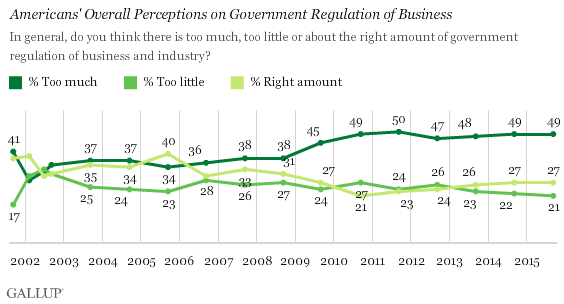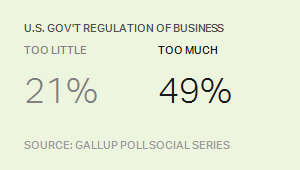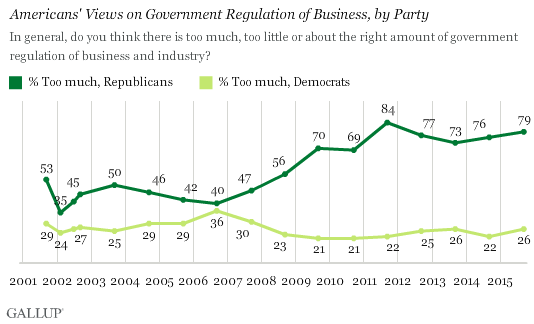Story Highlights
- About half (49%) say gov't regulates business too much
- Near low of 21% say gov't regulates business too little
WASHINGTON, D.C. -- While a sturdy 49% of Americans say the government regulates business too much, a near-low percentage instead say it regulates too little (21%). The latter response has experienced a six-percentage-point drop from 2010, while the former has remained virtually unchanged since 2009. Another 27% of Americans judge the current regulatory approach as about right.

The latest data are from Gallup's annual Governance survey, conducted Sept. 9-13. Moods toward government regulation of business have fluctuated as party control of the White House has changed, though generally more Americans say government regulation of business is too much. But the presidency of Democrat Barack Obama has seen a marked rise in the percentage saying "too much," with the figure typically hovering around 50%. By contrast, the average rate of Americans choosing this response was 36% over the eight years of Republican George W. Bush's administration.

In 2009, the first year of Obama's presidency, the percentage saying the government regulates business too much spiked seven points to 45%. This development came in spite of the fact that only about a year prior, the U.S. financial system suffered a major panic attributed to excessive loans by major lending companies, along with a lack of meaningful oversight by governmental entities responsible for regulating major financial companies. It should be noted, however, that this view is not universally accepted. The rise in "too much" has been sustained throughout the Obama presidency, reaching as high as 50% and never falling below the 2009 reading.
As Gallup showed last year, the exponential-like increase in Republicans saying government regulates business too much -- climbing from 40% in 2006 to a peak of 84% in 2011 -- is clearly a major factor in the overall rise in this response rate. This year, about eight in 10 Republicans are in the "too much" camp, far exceeding the percentage of independents (46%) or Democrats (26%) who are similarly aligned.

But a more recent, albeit subtler, shift in overall public opinion also appears evident in this year's survey. The share of Americans saying government regulates business too little is at a near low, and has fallen six points since 2010 -- with that percentage shifting to the "about right" category, which has, in turn, also risen six points since 2010. While not a dramatic movement, there does appear to be less support for the notion that government regulates business too little.
Bottom Line
Close to a majority of Americans judge government regulation of business to be excessive, as has been the case throughout the Obama presidency. In particular, large amounts of Republicans believe government regulation of business to be too much, suggesting that proposals by GOP presidential candidates to roll back government regulation will be warmly received by their base.
Meanwhile, there is falling support for the notion that the government regulates business too little, even if this idea has played an important role in the platform of competitive presidential candidates such as Democratic Sen. Bernie Sanders.
Historical data are available in Gallup Analytics.
Survey Methods
Results for this Gallup poll are based on telephone interviews conducted Sept. 9-13, 2015, with a random sample of 1,025 adults, aged 18 and older, living in all 50 U.S. states and the District of Columbia. For results based on the total sample of national adults, the margin of sampling error is ±4 percentage points at the 95% confidence level. All reported margins of sampling error include computed design effects for weighting.
Each sample of national adults includes a minimum quota of 60% cellphone respondents and 40% landline respondents, with additional minimum quotas by time zone within region. Landline and cellular telephone numbers are selected using random-digit-dial methods.
View survey methodology, complete question responses and trends.
Learn more about how Gallup Poll Social Series works.
